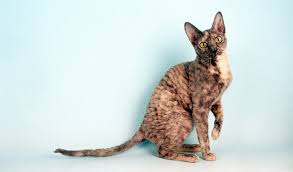
Cornish Rex
Conditions of detention
Cornish Rex cats are adaptable and thrive in various living environments, from apartments to larger homes. They are active cats that enjoy having plenty of space to explore and play. Providing them with climbing structures and interactive toys can help satisfy their playful nature.
Useful Fact:
The Cornish Rex is known for its playful and energetic demeanor. They enjoy being the center of attention and often engage in games with their human companions, making them ideal pets for active families.
Nutrition and diet
Cornish Rex cats require a balanced diet rich in high-quality proteins and essential nutrients to support their active lifestyle and maintain their unique coat. Both wet and dry cat food are suitable, but it’s important to ensure they receive all necessary vitamins and minerals.
Useful Fact: Because of their high energy levels, Cornish Rex cats may benefit from frequent, smaller meals to keep their metabolism steady and prevent overeating.
Health
Cornish Rex cats are generally healthy but can be prone to some genetic health issues such as hypertrophic cardiomyopathy (HCM) and patellar luxation. Regular veterinary check-ups are essential to monitor their overall health and catch any potential issues early.
Useful Fact: Due to their short coat, Cornish Rex cats are more susceptible to temperature extremes and should be kept in a warm, comfortable environment.
Grooming and care
The Cornish Rex’s short, wavy coat requires minimal grooming. Weekly brushing is usually sufficient to keep their coat in good condition and reduce shedding. Regular dental care, ear cleaning, and nail trimming are also important.
Useful Fact: Bathing your Cornish Rex occasionally can help manage oil buildup on their skin, which is more noticeable due to their short coat.
Education and training
Cornish Rex cats are intelligent and respond well to positive reinforcement techniques. They can learn basic commands, use a litter box effectively, and enjoy interactive play.
Useful Fact: Early training and socialization help Cornish Rex cats develop good behavior patterns and adaptability.
Toys and entertainment
Cornish Rex cats are playful and enjoy a variety of toys, including interactive toys, puzzle feeders, and feather wands. Providing different types of toys helps keep them mentally and physically stimulated.
Useful Fact: Rotating toys regularly can keep your Cornish Rex engaged and prevent boredom, as they are highly curious and energetic.
Safety
Ensure your home is cat-proofed by securing windows and balconies and keeping hazardous substances out of reach. Microchipping and providing ID tags are recommended for identification.
Useful Fact: Creating a safe indoor environment with plenty of enrichment can prevent the need for outdoor exploration, reducing the risk of accidents or injuries.
Accessories
Essential accessories for a Cornish Rex include a sturdy scratching post, a comfortable bed, and various grooming tools. A cat carrier is also important for trips to the vet or travel.
Useful Fact: Investing in high-quality scratching posts and beds can significantly enhance your cat’s comfort and well-being, accommodating their active nature.
Socialization
Cornish Rex cats are sociable and enjoy spending time with their human companions. They generally get along well with other pets and people if properly introduced. Early socialization helps them become well-adjusted and friendly.
Useful Fact: Introducing them to different environments and experiences at a young age can prevent fearfulness and promote confidence, given their inquisitive nature.
Travel and Transportation
When traveling, use a secure and comfortable cat carrier. Familiarize them with the carrier beforehand to reduce stress. Regular breaks and hydration are important during long trips.
Useful Fact: Short practice trips can help your Cornish Rex get used to traveling, making longer journeys less stressful.
Behavior and psychology
Cornish Rex cats are known for their playful, affectionate, and curious nature. Understanding their need for mental and physical stimulation can help in managing their behavior and keeping them happy.
Useful Fact: Providing interactive toys and engaging activities can help prevent behavioral issues such as scratching or excessive meowing, satisfying their high energy levels.
Legal aspects
Check local regulations regarding pet ownership, as there may be specific requirements for keeping cats, including licensing and vaccination. Ensure you comply with all legal aspects to avoid complications.
Useful Fact: Keeping your cat’s medical records and identification up-to-date can be helpful in legal matters and in case of emergencies.


